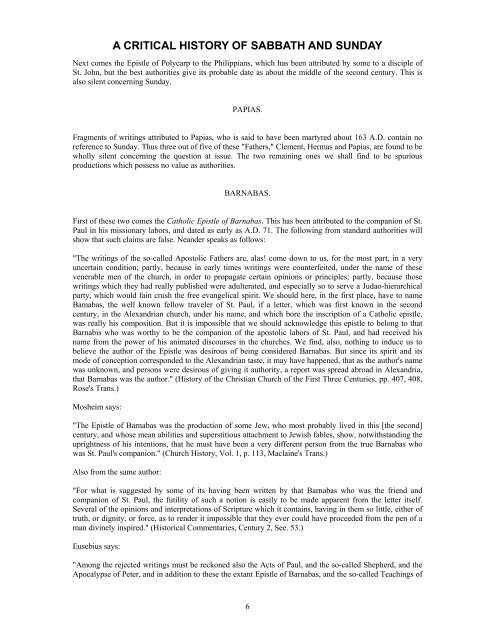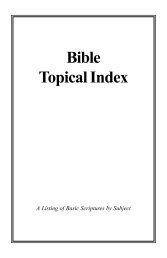a critical history of sabbath - Giving And Sharing
a critical history of sabbath - Giving And Sharing
a critical history of sabbath - Giving And Sharing
You also want an ePaper? Increase the reach of your titles
YUMPU automatically turns print PDFs into web optimized ePapers that Google loves.
A CRITICAL HISTORY OF SABBATH AND SUNDAY<br />
Next comes the Epistle <strong>of</strong> Polycarp to the Philippians, which has been attributed by some to a disciple <strong>of</strong><br />
St. John, but the best authorities give its probable date as about the middle <strong>of</strong> the second century. This is<br />
also silent concerning Sunday.<br />
PAPIAS.<br />
Fragments <strong>of</strong> writings attributed to Papias, who is said to have been martyred about 163 A.D. contain no<br />
reference to Sunday. Thus three out <strong>of</strong> five <strong>of</strong> these "Fathers," Clement, Hermas and Papias, are found to be<br />
wholly silent concerning the question at issue. The two remaining ones we shall find to be spurious<br />
productions which possess no value as authorities.<br />
BARNABAS.<br />
First <strong>of</strong> these two comes the Catholic Epistle <strong>of</strong> Barnabas. This has been attributed to the companion <strong>of</strong> St.<br />
Paul in his missionary labors, and dated as early as A.D. 71. The following from standard authorities will<br />
show that such claims are false. Neander speaks as follows:<br />
"The writings <strong>of</strong> the so-called Apostolic Fathers are, alas! come down to us, for the most part, in a very<br />
uncertain condition; partly, because in early times writings were counterfeited, under the name <strong>of</strong> these<br />
venerable men <strong>of</strong> the church, in order to propagate certain opinions or principles; partly, because those<br />
writings which they had really published were adulterated, and especially so to serve a Judao-hierarchical<br />
party, which would fain crush the free evangelical spirit. We should here, in the first place, have to name<br />
Bamabas, the well known fellow traveler <strong>of</strong> St. Paul, if a letter, which was first known in the second<br />
century, in the Alexandrian church, under his name, and which bore the inscription <strong>of</strong> a Catholic epistle,<br />
was really his composition. But it is impossible that we should acknowledge this epistle to belong to that<br />
Barnabis who was worthy to be the companion <strong>of</strong> the apostolic labors <strong>of</strong> St. Paul, and had received his<br />
name from the power <strong>of</strong> his animated discourses in the churches. We find, also, nothing to induce us to<br />
believe the author <strong>of</strong> the Epistle was desirous <strong>of</strong> being considered Barnabas. But since its spirit and its<br />
mode <strong>of</strong> conception corresponded to the Alexandrian taste, it may have happened, that as the author's name<br />
was unknown, and persons were desirous <strong>of</strong> giving it authority, a report was spread abroad in Alexandria,<br />
that Barnabas was the author." (History <strong>of</strong> the Christian Church <strong>of</strong> the First Three Centuries, pp. 407, 408,<br />
Rose's Trans.)<br />
Mosheim says:<br />
"The Epistle <strong>of</strong> Barnabas was the production <strong>of</strong> some Jew, who most probably lived in this [the second]<br />
century, and whose mean abilities and superstitious attachment to Jewish fables, show, notwithstanding the<br />
uprightness <strong>of</strong> his intentions, that he must have been a very different person from the true Barnabas who<br />
was St. Paul's companion." (Church History, Vol. 1, p. 113, Maclaine's Trans.)<br />
Also from the same author:<br />
"For what is suggested by some <strong>of</strong> its having been written by that Barnabas who was the friend and<br />
companion <strong>of</strong> St. Paul, the futility <strong>of</strong> such a notion is easily to be made apparent from the letter itself.<br />
Several <strong>of</strong> the opinions and interpretations <strong>of</strong> Scripture which it contains, having in them so little, either <strong>of</strong><br />
truth, or dignity, or force, as to render it impossible that they ever could have proceeded from the pen <strong>of</strong> a<br />
man divinely inspired." (Historical Commentaries, Century 2, See. 53.)<br />
Eusebius says:<br />
"Among the rejected writings must be reckoned also the Acts <strong>of</strong> Paul, and the so-called Shepherd, and the<br />
Apocalypse <strong>of</strong> Peter, and in addition to these the extant Epistle <strong>of</strong> Barnabas, and the so-called Teachings <strong>of</strong><br />
6



